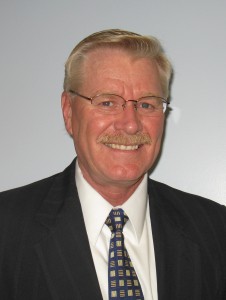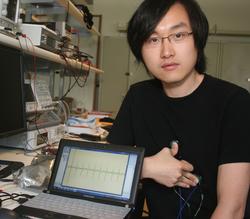Daily Business Report — June 9, 2010
NTD Architecture Acquires Salinas Firm
NTD Architecture has acquired Salinas-based HBFL Architects, a firm that has provided architectural services for several educational facilities in California’s central coast. Thomas Lukes and Richard Fedelem of HBFL will join NTC Architecture’s Godwin Osifeso, Chris Vicencio and Regina Bills-Dacong in the leadership of the Salinas practice. The office will staff a combined total of 11professionals, including Roland Goodman and Paul Whitehill.
KUITY Corp. Hires Former SPAWAR Commander
KUITY Corp. has named Frank Unetic as vice president of business development and the firm’s senior program manager for the federal government and the Department of Defense. Unetic, who retired from the Navy in 2007, was the commanding officer for SPAWAR Systems Center San Diego, where he led one of the largest Navy research and development organizations. Previously, Unetic served as major program manager for naval submarine communications, responsible for the oversight of development, fielding and support for submarine communications systems. Unetic holds a master’s degree from the University of Phoenix and a bachelor’s degree from the University of Minnesota.
Scott Bartlett Joins SharePoint360
SharePoint360 has hired Scott Bartlett, formerly with Microsoft, as a member of the SharePoint360 Delivery Team. Bartlett was an industry market development manager for Microsoft and held management positions at Trimble Navigation LTD, Leica Geosystems AG, Autodesk and Silicon Graphics Inc. He holds a bachelor’s degree from Utah State University.
Cavignac & Associates Names Surety Department Manager

Gerrit “Gary” Brouwer has been named surety department manager for Cavignac & Associates. Brouwer, a 29-year veteran of the surety bond industry, will serve as the primary liaison between the agency’s surety accounts and surety companies. Brouwer also will be tasked with developing and supporting new business and marketing the agency’s surety bond services. For the past 15 years, Brouwer has served as senior surety underwriter for Nationwide Mutual Insurance Co. in La Mesa. Previous career experience includes six years as a surety manager for Fireman’s Fund Insurance Co. in San Diego; five years as a senior bond underwriter for Insurance Company of the West, also in San Diego; and three years as a bond underwriter for Continental Insurance Co. in Toronto.
Program Focuses on Tenant Opportunities
“Opportunities for Tenants in San Diego” is the subject of a June 15 program sponsored by Jones Lang LaSalle in conjunction with the law firm Mintz, Levin, Cohn, Ferris, Glovsky and Popeo. It will be presented from 7:30 to 9 a.m. at the San Diego office of Mintz Levin, 3580 Carmel Mountain Road, Suite 300, in San Diego. The presentation will feature an overview of today’s volatile economy and how it translates to the San Diego commercial tenant, specifically regarding opportunities for tenants in the Sorrento Mesa and Sorrento Valley submarkets, which typically have some of the highest vacancy rates. Topics will include available landlord concessions, tenant improvement allowances to ensure on budget and on time improvement work, and how to reduce occupancy costs and mitigate risk when leasing space. Panelists include Jones Lang LaSalle representatives, Scot Ginsburg, managing director, tenant representation; Bob Prendergast, managing director, capital markets; Doug Cowan, executive vice president, project and development services; and Scott Biel, a member of Mintz Levin’s real estate section. Light breakfast and beverages will be served. To RSVP, contact Jenna Herman at Jenna.Herman@am.jll.com or (858) 410-1240.
Cal State San Marcos Offers New Master’s Program
California State University San Marcos has launched a new Master’s of Arts in Education with an Option in Communicative Sciences and Disorders that will prepare students for practice in the field of speech-language pathology. The new program was approved by the California Commission on Teacher Credentialing and is in-candidacy with the Council on Academic Accreditation of the American Speech-Language-Hearing Association. It is designed to provide graduate students with the skills and knowledge in practice related to the assessment and treatment of individuals across the lifespan with a broad array of communication and swallowing disorders. The program is geared toward practice in the public schools. The program, offered by the College of Education in partnership with Extended Learning, will begin its first cohort of students this fall semester, and is accepting applications online through July 1. Admitted students will enroll for a total of 75 units over five semesters, including 400 hours of supervised community-based practice in speech language pathology. Upon completion of the program, students will be eligible for state licensure, CTC credentialing and ASHA certification. For more information, visit csusm.edu/el/csd or call (760) 750-4020.
Wireless Sensor Startup Wins UCSD Entrepreneur Challenge

Wireless sensors that monitor your heart even though they do not actually touch your skin are at the center of UCSD electrical engineering PhD student Yu Mike Chi’s dissertation. This technology — and the plan for commercializing it — earned Chi and his Cognionics team the top spot in the UCSD Entrepreneurship Challenge. The prize includes $25,000 in cash for the startup and $15,000 in legal services.
Engineers and physicians are increasingly looking to wireless technologies and innovative circuit designs to develop sensors that cut health care costs through better preventative care and shorter hospital stays. Wireless sensors also offer patients more freedom than wired sensors hooked to machines. The UCSD wireless sensor project could lead to unobtrusive heart sensors for long-term cardiac health monitoring that do not touch the skin and do not tether patients to machines.
The sensors record “biopotentials” — tiny voltage signals that appear on the skin surface. Biopotentials emanate from electrically active cells, such as neurons and cardiac cells, and propagate through the conductive media of the human body.
At the final phase of the Entrepreneur Challenge on June 2, Chi gave a 12- minute presentation of the Cognionics business plan to the panel of judges, followed by an eight-minute question-answer period. When the Q&A finished with a few minutes to spare, Chi quickly set up a live demo. Pressing the sensor into his chest, over his clothes, the electrical activity of his heart appeared on the giant presentation screen.
Chi is also working on wireless sensors that record brain activity, though these sensors are not part of the winning business plan.
Chi is developing these technologies under the guidance of professor Gert Cauwenberghs from the Department of Bioengineering at the UCSD Jacobs School of Engineering. Cauwenberghs is also co-director of the UCSD Institute for Neural Computation.
The new sensors that Cognionics is developing are “wireless” in two different respects. First, the sensors record biopotential through clothing fabrics, and therefore do not touch the skin directly. “Today you have to put sticky patches on your chest to record this information. It’s uncomfortable and messy,” said Chi.
Second, the information the sensors collect is sent to computers over wireless channels, rather than over wires.
“One of the goals of this wireless sensor project is to take the sensing technology out of the typical hospital setting and into the home environment, without constraining the mobility of the patient,” said Cauwenberghs. “Also, our approach could allow you to monitor cardiac or brain activity during exercise, or to monitor the health of soldiers in the battlefield, so it can be transformative in that sense.”
Various wireless sensor prototypes for recording biopotential have been around since at least the 1960s, but according to Chi, “no one has gotten it past a lab prototype…you don’t see them out in the marketplace.”
Chi cited problems with cost, reliability, and difficulty recording clinically relevant electrical signals as causes of the roadblocks, particularly because wireless sensors are more complex than the wired versions.
“We managed to reduce the circuitry for the sensor into a single integrated circuit that makes it more reliable and cheaper than other methods. We have two lab prototypes that are working,” said Chi.
“There are other companies that are doing wireless sensors, but Mike’s solution offers one that eliminates not only the wires for transmitting the data, but also the wires between electrodes that are conventionally needed to establish a voltage signal with a reference and ground,” explained Cauwenberghs.
Chi says he is dedicated to launching this company in San Diego after he finishes his PhD. “I want to stay in San Diego. Wireless heath is starting to become a big thing in San Diego,” said Chi.
The Cognionics Team
Cognionics is an early stage startup project, whose members include:
• Yu Mike Chi: PhD student, Electrical and Computer Engineering Department,UCSD Jacobs School of Engineering
• Yuchen Cao: PhD student, Department of Chemistry, UCSD
• Mehmet Parlak: PhD student, Electrical and Computer Engineering Department, UCSD Jacobs School of Engineering
• Ping Wang: PhD student, Salk Institute
• Stephen Chen: PhD student, The Scripps Research Institute
“Von Liebig has been a great help,” said Chi, who took the entrepreneurship for engineers course sequence as a graduate student from the William J. von Liebig Center for Entrepreneurism and Technology Advancement at UCSD. “We received a lot of great advice from our von Liebig adviser, Mike Elconin.” Cognionics is working with the UCSD technology transfer office on the intellectual property process.
A Lab to Market team from the UCSD Rady School of Managment
also provided crucial support. The Rady School team, all graduating MBAs, included Silvia Mah, Lydia Grypma and Kabir Gambhir, Xiluo ‘Neal’ Chen and Ali Esteghlalian.
Cognionics already won the elevator pitch competition and made it to the finals in the executive summary competition, both part of the Entrepreneurship Competition. At the final event, Cognionics also won the Audience Choice ($1,000) award and best entry in the hi-tech track ($2,000).
Chi also acknowledged advisory assistance from Qualcomm, CONNECT and Oregon State University.
While describing how the current technology was developed, Chi said, “We took a look at what was out there, how people were building sensors today, and we realized people were using clunky hacks, and we saw it would be simpler if it were on a single circuit…it’s about customization.”
(UCSD Jacobs School of Engineering Report)
The Daily Business Report is produced by REP Publishing Inc., publisher of San Diego Metropolitan Magazine, the North Park News, Kensington News and the West Coast Craftsman. (619) 906-4104.

